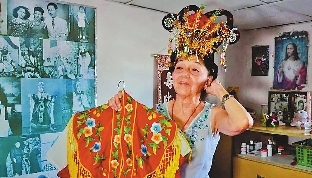
“I AM Cuban by birth, but my heart is Chinese.” When Caridad Amaran talks about her recent trips to China, tears well up in her eyes. Amaran, 88, one of the last two living divas of Cantonese opera in Cuba, has dedicated her life to promoting Chinese culture. However, only recently has she gotten the chance to visit the faraway land that inspired her life on stage. She and her colleague Georgina Wong performed in the southern Chinese cities of Kaiping, Enping, and Guangzhou in Guangdong Province, as well as in China’s Hong Kong, in 2011, 2014 and this March. Born in western Cuba’s Pinar del Rio Province, Amaran lost her father at the age of 1 month. Her mother then relocated to Havana, and they settled in the capital’s Chinatown. After living with a Chinese cook named Rafael Jo for one year, they were forced to leave the house as its owner came down with a severe and contagious lung disease. The future looked bleak for the mother and daughter, until a Chinese immigrant who had just arrived on the island took pity upon and sheltered the two. The immigrant, Julian Fong, worked at a laundry. “Opposite the laundry was the Kwok Kwong Cantonese Opera Company, and he would take me to watch the rehearsals,” Amaran recalled. Amaran was only 4 then. “I wanted to stay and learn, but they did not accept me because I was very young.” Finally, Fong decided to teach her. At the age of 8, Amaran made her debut with the stage name Caridad Jo. By then, there were 15 young performers of Chinese descent, including Wong, who performed at the Golden Eagle Theater, the Chinatown’s cultural center. In those days, Havana’s Chinatown received Cantonese opera companies from San Francisco, Los Angeles, Honolulu and Hong Kong. In the early 1950s, the three then-existing theatrical companies gradually disbanded. Amaran went to work as a cashier at a Chinese restaurant in Havana. In 1994, after the creation of a state agency to preserve and promote Havana’s Chinatown, Amaran was reunited with Wong and three other former performing partners. They decided to relaunch their stage careers. This revival of Cantonese opera led the divas, as they were affectionately called, out of Chinatown and into the wider world of Havana theater. Lau Pok Chi, an American photographer born in Hong Kong, met Amaran and Wong while researching Cuba’s Chinese descendants. He was first to record the “Havana Divas,” then produced videos about their history and broadcasted them on television in China. In 2011, Amaran and Wong traveled to China, where they performed for two weeks in several cities and visited the town of their ancestors. Later, they visited twice more. “That was a dream come true, because I could never go when I was young,” said Amaran. (Xinhua) | 
